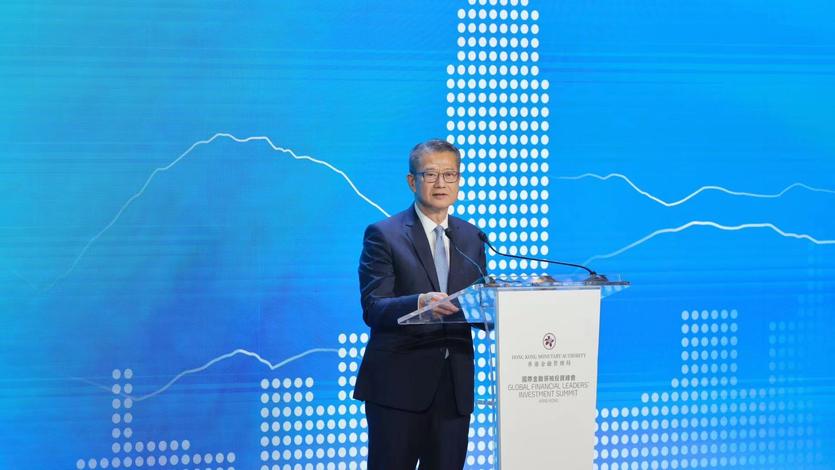 Financial Secretary Paul Chan Mo-po delivers a speech during the Global Financial Leaders' Investment Summit at Four Seasons Hotel in Hong Kong on Nov 2, 2022. (ANDY CHONG / CHINA DAILY)
Financial Secretary Paul Chan Mo-po delivers a speech during the Global Financial Leaders' Investment Summit at Four Seasons Hotel in Hong Kong on Nov 2, 2022. (ANDY CHONG / CHINA DAILY)
Hong Kong will build a comprehensive regulatory framework for the virtual asset industry that will actively encourage technological innovation while ensuring appropriate risk management, Financial Secretary Paul Chan Mo-po said.
Last month, the Hong Kong Special Administrative Region government issued its “Policy Declaration on the Development of Virtual Assets in Hong Kong”, which clarified the government’s vision and guidelines for the development of virtual assets in Hong Kong.
“We must not only make full use of the potential brought by innovative technologies, but also carefully guard against possible fluctuations and potential risks, and more importantly, prevent these risks and impacts from being transmitted to the real economy,” Chan said in his blog on Sunday.
“There have been repeated virtual currency crashes or related trading platforms applying for bankruptcy protection, which just reflects that transparent operations and proper supervision can make this industry stable and sustainable,’ the finance chief added.
The HKSAR government has put forward several pilot plans for the virtual-asset industry, including the issuance of a new batch of tokenized green bonds for institutional investors by the end of this year, which will become the first batch of tokenized government bonds in the world, Financial Secretary Paul Chan Mo-po said
Chan’s comments follow the collapse of cryptocurrency exchange FTX, which filed for bankruptcy protection last week in one of the highest profile crypto blowups, after traders rushed to withdraw $6 billion from the platform in just 72 hours. Rival exchange Binance abandoned a proposed rescue deal after examining FTX’s finances.
The Hong Kong Special Administrative Region government has put forward several pilot plans for the virtual asset industry, including the issuance of a new batch of tokenized green bonds for institutional investors by the end of this year, which will become the first batch of tokenized government bonds in the world, the finance chief said.
READ MORE: Paul Chan: HK is the best global financial center in Asia
The Hong Kong Monetary Authority is also studying having the digital Hong Kong dollar serve as the backbone and pillar connecting legal tender and virtual assets, and has conducted a consultation earlier to explore how to regulate stablecoins used for payment purposes.
The Securities and Futures Commission has licensed two virtual asset exchanges, eight virtual asset fund management companies, and approved two brokerages to conduct virtual asset transactions for their clients under the omnibus account management. The SFC is conducting a public consultation on the additional safeguards required for retail investors to purchase and sell virtual assets to a limited extent under the new licensing regime.
“The government welcomes the possibility of introducing virtual asset exchange-traded funds in Hong Kong,” Chan said.
ALSO READ: Digital yuan to spread its wings
Duncan Chiu, the Legislative Council member from the Technology and Innovation functional constituency, said, “There is a big chance that virtual currency will not disappear, and it will exist in the long run and become a new asset class.”
With Hong Kong’s experience as an international financial center and its professional codes of practice, Chiu is confident that Hong Kong can establish itself as a trading center, product center and talent center for virtual assets.
But Chiu also agreed that regulatory issues have to be clarified in order to spur market development. “How to prohibit spam, sensational sales, and protect retail investors? How can technology platforms replace the government as market monitors and balance the interests of all parties? There are many issues that need to be discussed.”


